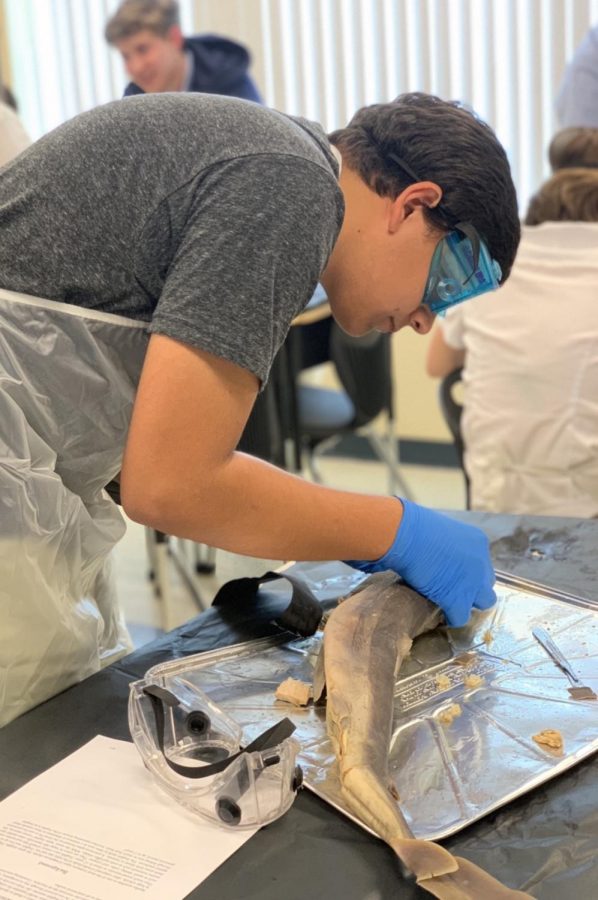Shark Dissection Leaves Lasting Impression
Marine Biology Students Dissect a Shark and Have Differing Opinions
Junior, Austin Poonia, attempts to remove the brain of a dogfish shark during the dissection on Friday, November 30th.
December 10, 2018
Dissections are a high school experience that usually go unforgotten, and depending on the person, it can be in a good or bad memory. On November 30th, the Marine Biology class worked on dissecting a dogfish shark. Some students participating in the dissection find it exciting and interesting, while others believe it is inhumane, or animal cruelty.
On Thursday, November 29th, prior to the actual dissection, students worked on a paper model of the shark to prepare them for the real thing. Some students weren’t too keen on the idea of actually dissecting a shark.
“I feel a bit nervous, I mean, I’ve never dissected something before. I was trying to get through high school without ever dissecting something, but I guess it’s an experience I’ll only have once,” junior, Austin Poonia, says.
Other students saw it as an educational experience, and thought that doing the dissection would benefit them in the future..
“I think that it’s good so that we could know more about creatures like sharks,” junior, Jose Cruz, says. “I’m pretty excited because I’ve never dissected a shark before.”
The day of the dissection, some of the students who were nervous had gotten over it, and almost the whole class participated. Students could be seen watching from the back of the class, because they weren’t comfortable with dissecting the shark, or thought it was wrong.
“So many animals are being bred just to be killed and it’s sad,” junior, Tiffany Valentin, says. “However, it helps students to learn about the organisms and their functions in a more hands on approach.”
According to, The National Anti-Vivisection Society, around 12 million animals are killed each year solely for the purposes of dissection. Many of these animals weren’t already dead; but instead harvested and killed for the purposes of biological study, which many students don’t know. Specifically, fish and sharks are taken from the wild and killed, then sold to biological supply companies in order to make a profit.
“I would agree that harming an animal, or more specifically, making an animal suffer, is wrong, but in this case the shark is already dead, and by dissecting it you’re not harming it any further” junior, Ryan DeVone, says.
Mrs. Karen Tripp, the marine biology teacher, understands that students have different views and opinions on whether dissecting a shark is inhumane and unethical. She allowed the students who didn’t want to participate to watch videos, or even look at photos if they want to.
“I think that students empathize for the organisms being used for dissections,” Ms. Tripp says. “That is a good quality to have.”



